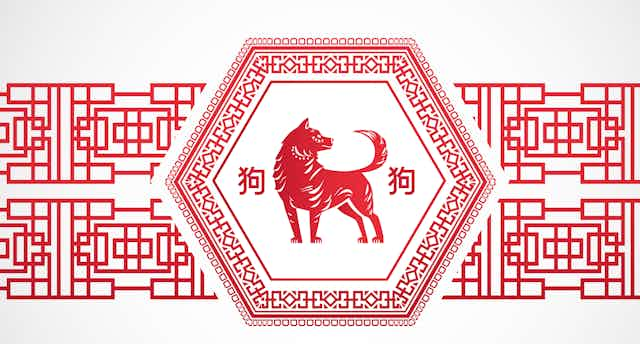For the Western world, 2017 has been a year of (largely) self-inflicted chaos. Europe’s 60-year project of self-realisation faces unprecedented challenges to its ideological and territorial rationale. In the US, a populist president is pitted against institutional structures defined by checks and balances. Meanwhile, China has consolidated its position as a global economic power and an emerging military power, led by its undisputed leader, President Xi Jinping. In 2018, what will the rise of China bring for Europe? Surprisingly, insights from Chinese astrology tally well with political analysis. Both envisage shifts in the EU’s international focus and a stronger recognition of the flaws of its own neoliberal system.
According to the Chinese calendar, 2018 is the year of the Brown Earth Dog. The dog is an ethical and idealistic sign that symbolises justice, openness, tolerance and innovation. From this perspective, 2018 indicates a rest from the fireworks of 2017. An Earth Dog year gives international communication a chance – for those who choose to engage. In all, 2018 could be a decisive year for EU foreign policy and social justice.
Looking East
Global environmental security presents a promising platform for constructive EU-Chinese relations. In Chinese cosmology, the Earth element fosters environmental awareness, along with questions of rational foresight. China, the most pragmatic of nations, is developing a serious interest in renewables.

Although stubborn in pursuit of its long-term goals, China may be willing to engage proactively with the EU over its aims to secure environmental sustainability. The US threatens to cut itself off from any Western-Chinese cooperation on these issues through its withdrawal in 2017 from the Paris climate agreement.
Trump: Europe steps back
Born under the sign of the Fire Dog, Trump is an aggressive leader who finds it hard to control his emotions, particularly if his position is threatened. This increases the potential for global conflict and simultaneously for a distancing of Europe from America over values and foreign and military policy. Trump’s retweeting, without further comment, of hate materials produced by the ultra-nationalist group Britain First, was met with widespread condemnation in Europe. His intervention in the delicate balance of Israeli-Palestinian conflict and provocation of the unpredictable Kim Jong Un has horrified European foreign policy makers.
Macron’s moment
For much of 2017, Germany was the fulcrum of the power politics between the EU and its member states. However, since the inconclusive German election of September 2017, Angela Merkel has had to devote time and attention to establishing a viable government at home. Even if current attempts to launch a renewed grand coalition are successful, detailed negotiations over policy and posts can be expected to preoccupy party leaders well into the new year. A distracted Germany offers the French president, Emmanuel Macron, an opportunity to rebalance the Franco-German relationship, with a more prominent role for France. This would allow him to harness the EU’s resources in furthering his policy aims at home and in the wider world.

One of Macron’s foreign policy aims is to redefine his country’s African policy. Macron sees a compliant Africa both as crucial to the fight against Islamist militancy and as an arena for French investment and business opportunities. He wants to break with the “Francafrique” collusion between French leaders and some less than democratic African leaders to instil a new transparency in Franco-African relations. Success in such an endeavour is more likely from an EU platform than a national one. At EU level, therefore, we are likely to see a new direction in the politics of the European periphery.
It was Germany’s resurgence that led the eastern expansion of the EU in the 1990s at the expense of the southern flank, France’s traditional sphere of influence. Germany’s current economic power within the EU and Russia’s intractability on its eastern flank mean that the EU’s eastern neighbourhood is set to remain a foreign policy focus. However, France’s position post-Brexit as the EU’s sole convincing military power and the rebalancing of the Franco-German relationship implies a new and significant focus on the southern neighbourhood.
Social issues reach boiling point
While the year of the Brown Earth Dog sets the scene for more rational political exchange, this by no means implies an end to political turmoil in the EU. The dog years’ propensity for justice and innovation suggest that slow-burning social issues might come to a head. Decades of neoliberal economic developments have led to increasingly polarised societies while fast-moving technological innovation and the forces of globalisation are leading to the development of a new “precariat” – a marginalised class – in European countries. Just as the EU will be faced with decisions of principle over its foreign policies and international alliances, it will need to address hard questions about its democratic values and the place social justice should occupy in a democratic society.
Recent research suggests that if the EU project is to flourish in 2018 and beyond, it will need to demonstrate its worth to EU citizens, or risk a more significant drift to populism. The research identifies six groups, or opinion “tribes”, across the EU. Over a third of EU citizens – the largest of the tribes – can be termed “hesitant Europeans”. This tribe’s sheer size and its concentration in the more powerful north-western member states means that its members’ views matter for EU decision-makers. Of all the tribes, the hesitant Europeans are the most likely to be politically apathetic. Typically of working age, on modest incomes and ill disposed towards immigrants, they are currently indifferent towards Europe and need to be actively persuaded of the EU’s benefits.
One last point – the Chinese year of the Brown Earth Dog doesn’t actually start until February 16 2018. These are the dying days of the year of the garrulous and selfish Fire Chicken.

